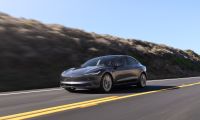Early this month, Tesla Motors CEO Elon Musk and a few select members of his team had the usual conference call with analysts following the second quarter earnings report. Musk raised some eyebrows with several bold statements, as we reported at the time. His most important claim of all, however, has not been given the attention it is due.
The Motley Fool (via Charged EVs) picked up on this under-acknowledged statement and used it as supporting evidence in a recent piece titled “Tesla Motors, Inc.’s Gigafactory May Be More Revolutionary Than We Realize.” Even with all the hype, could we really still be underestimating the potential impact of Tesla’s ambitious battery manufacturing facility?
Beyond cost parity with gasoline vehicles
Musk’s most important words from that conference call: “I would be disappointed if it took us 10 years to get to a $100/kWh pack.”
Considering the implications of that statement, it is surprising that not much has been made of it since (we will take part of the blame, as it was only a small piece of our initial report on the conference call).
Perhaps the response has been largely muted because the year 2024 seems so far away, or because that conference call was packed with interesting and important bits of information, or because it is such an ambitious target that industry analysts are reluctant to put much faith in Tesla achieving it.
Whatever the reason, we should sit up and take note of those words and the explanations that followed from CTO J.B. Straubel and Musk. As Deutsche Bank analyst Rod Lache observed during the call, $100/kWh at the pack level could be low enough for electric vehicles to undercut gasoline vehicles on price, let alone reach cost parity.
It almost goes without saying that once battery electric vehicles cost the same as conventional cars, the economic case for going electric will be overwhelming considering the difference in fuel costs. And $100/kWh prices for batteries as stationary energy storage could be a revolutionary development, particularly for the residential solar industry.
Can it be done?
Obviously, that question looms large. It is one thing to make bold proclamations, quite another to fulfill such prophecies. However, several other comments made by Musk and Straubel in the conference call instill a certain confidence in the optimists among us that they might just pull it off.
First, as the Motley Fool points out, Musk and his team have reiterated many times that the estimated 30% reduction in battery costs once the Panasonic-backed Gigafactory comes online is conservative.
As Musk and Tesla have said, that number is not a long-term target but rather represents the minimum reduction anticipated by Tesla in the first year of Gigafactory production alone. And though we can’t be exactly sure of the company’s current battery costs, they are widely believed to be the lowest in the industry by far – somewhere in the mid-$200s per kWh at the pack level, according to most estimates.
No breakthrough necessary
So let’s cautiously say that Tesla’s current costs are $260/kWh. A 30% reduction due to the Gigafactory brings that total to $182/kWh in 2017, the first year of Model 3 production. In order to not disappoint Musk, we’ll target $100/kWh by 2023. How will Tesla get costs down an additional 45% in just six years?
“Seems pretty obvious to me,” Musk told Lache in the conference call. Straubel explained, saying that Tesla believes it can achieve the target without technological leaps and bounds, but through incremental improvements and its own methodical cost-reduction process made possible by bringing the entire manufacturing process under one big roof.
“To realize the Gigafactory and those cost targets, we don’t need some fundamental breakthrough in chemistry and material science,” Straubel said. “Those things are pretty well understood in front of us.”
So we will say again, dismiss Tesla’s process and Musk’s confidence at your own risk. If we have $100/kWh batteries by the early-mid 2020s, that means the landscape will have shifted significantly between now and then – and reaching that magic number will mean big things to come for electric vehicles.
Would Tesla be more profitable, and more help to the rest of the EV industry, if it spun off the car business and focused on driving down battery costs? Maybe. The success or failure of the Gigafactory will go a long way to determining the best answer to that question, and it doesn’t even have a final location yet. But it wouldn’t be wise to bet against it.
For the record, the author does not have any stock in Tesla. But he sure wishes he did.
Set as google preferred source












Comments
I think an important thing to
Permalink
I think an important thing to note is also another statement made by Musk a few months ago. That the next generation batteries(Not sure if he meant the ones coming to the Roadster 400 mile or the Model 3 batteries) cost about 60-70$ per kwh in material costs. This leaves plenty of room to cut down costs as-is. Add in incremental improvements and most definitely 100$ per kwh can be reached.
Look up Symbol Materials.
Permalink
In reply to I think an important thing to by Weapon (not verified)
Look up Symbol Materials. Then google for wyoming and lithium.
America is about to have the cheapest lithium in the world.
Basically, Tesla will have the cheapest batteries in the world, and will continue growing this.
When Tesla's battery cost
Permalink
When Tesla's battery cost drops to $100/KWH I'm thinking fuel cells will be pretty much obsolete. This might hurt Toyota which owns some stock in Tesla. Once model X and gen 3 cars hit the road in any numbers Tesla will have enough cash flow to cover the USA in superchargers.
Given that the current 25 kWh
Permalink
Given that the current 25 kWh upgrade costs $7000, or $280/kWh and that the overall GM on the Model S is about 25%, it is unlikely that the current pack costs $260/kWh.
More likely, the current pack costs are closer to $240/kWh with cell costs around $200/kWh.